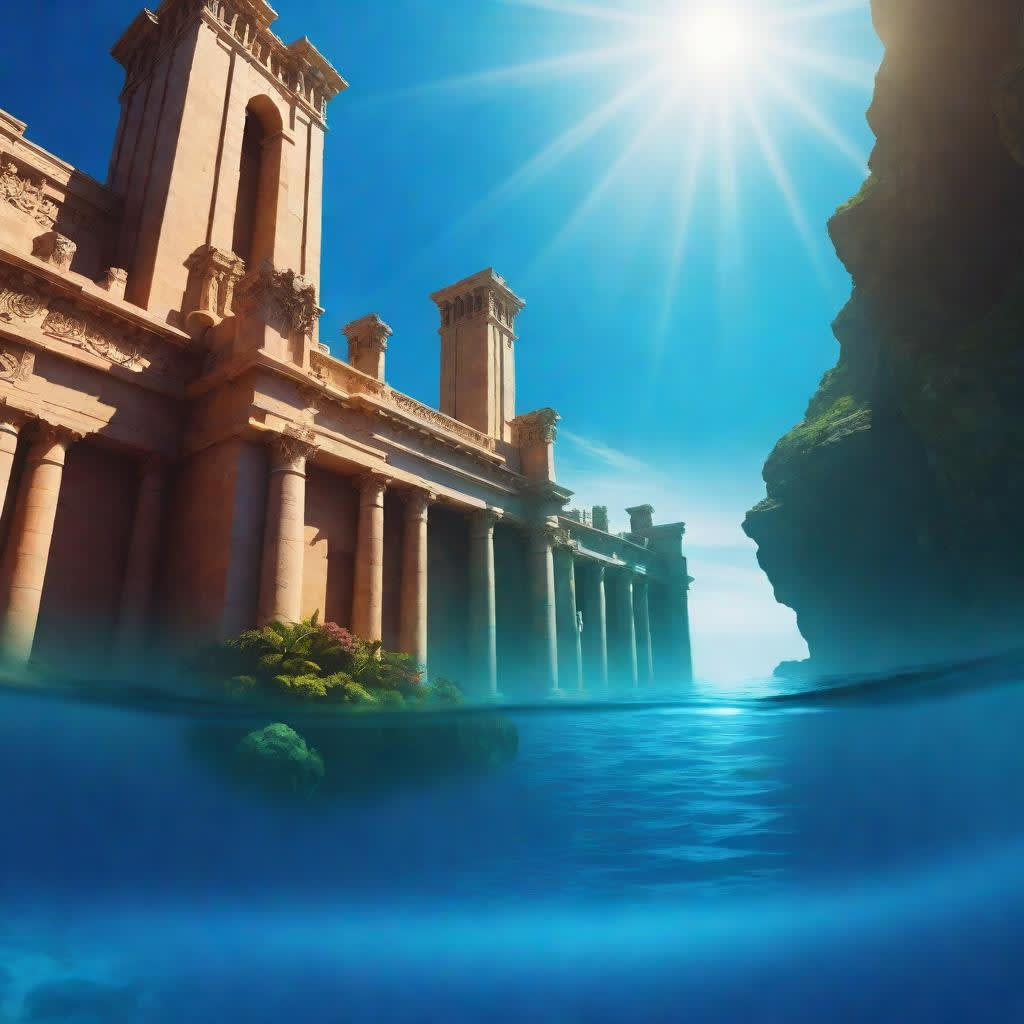
Ladies and gentlemen, despite our extensive knowledge of the past, there remains a wealth of undiscovered history pertaining to ancient civilizations.
From the enigmatic wisdom of the Mayans to the awe-inspiring structures erected by the Egyptians, there is still much to be learned. Among the most captivating mysteries is that of Atlantis. For over two millennia, tales of this sunken city have captivated imaginations, leading to the question: is Atlantis a mere myth or a genuine archaeological treasure?
In this presentation, we will delve into the enigma of Atlantis, seeking to uncover the truth behind this legendary civilization. Our exploration begins with the earliest recorded mentions of Atlantis, found in Plato's Socratic dialogues, Timaeus and Critias.
The dialogues, written by the Greek philosopher Plato around 360 BC, were intended for a speech during festivities honoring the goddess Athena. These dialogues recounted stories supposedly heard by Socrates from guests, shedding light on ancient Athens' interactions with other independent states. One notable story came from a man named Critias, who shared his grandfather's encounter with the Athenian poet Solon. Solon had visited Egypt and engaged in conversations with local priests. During these discussions, the priests spoke of a formidable ancient civilization situated on an island in the Atlantic Ocean. This civilization held sway over numerous other islands and territories across Africa and Europe.
The city was constructed in concentric rings of land and water, featuring elaborate baths, a vast harbor, and well-equipped barracks.
The Atlanteans possessed unparalleled engineering expertise, evidenced by an extensive canal network and irrigation system that transformed the landscape into lush, fertile lands capable of cultivating a wide variety of crops.
Their societal structure mirrored many contemporary civilizations, comprising a monarchy, a civil administration, and a formidable military apparatus.
Driven by their burgeoning power, the Atlanteans embarked on a campaign of conquest, waging war across Asia and Europe.
At that time, Athens stood as the sole state with the requisite resources to resist this invasion and successfully repelled the attacks.
Shortly thereafter, a series of earthquakes and floods culminated in the submergence of Atlantis beneath the sea, resulting in its permanent loss.
Consequently, we are compelled to ponder whether this narrative constitutes historical fact or mere fiction.
Plato's utilization of the Atlantis story in his discourse has prompted the majority of historians to conclude that it served primarily as a rhetorical device to bolster his argument.
The concept of a formidable aggressor being successfully resisted by a less powerful force is a timeless narrative of optimism in the face of adversity.
It has been proposed that the uncivilized behavior of the Atlanteans may in fact allude to the actions of the Persians or Carthaginians of the time, while the notion of an island abruptly vanishing could have been inspired by the eruption of Minoan Santorini around 1600 BCE, which devastated the island of Thera and significantly impacted settlements on nearby Crete, with repercussions felt as far as Egypt.
However, there are those who believe that Plato's writings were considerably more accurate historical accounts than they initially appear.
This is due to the fact that he personally asserted that it was a true story and even provided a specific date for Atlantis's submergence.
According to his account of events, Solon, who lived 200 years earlier, had directly inquired with an Egyptian priest in the city of Saïs about the incident's timing. According to inscriptions on the temple walls, the priest stated that it had occurred 9,000 years earlier, placing the date around 9,600 BCE.
This is a remarkably precise date that corresponds to a significant geological event that occurred around that time.
The global event known as "Meltwater Pulse 1b" was triggered by the release of water from the polar ice sheets, resulting in a sea level rise of approximately 14 meters. Evidence of this event has been discovered in various locations worldwide, including the Caribbean, the Mississippi River, and the Gulf of Mexico. This rise in sea level would have had a devastating impact on low-lying island communities.
Now, let us delve into the Egyptian connection to Atlantis. The Egyptian Atlantis, referred to as "Aha-Men-Ptah," has left a lasting impression on Egyptian culture and is frequently mentioned in funerary texts. Notably, "Aha-Men-Ptah" translates to "The West" in Egyptian, and the concept of the West is associated with death and burial. This suggests that the idea of traveling westward was linked to a significant number of deaths.
Certainly, there are still numerous aspects of Ancient Egypt that remain enigmatic, particularly the construction methods of the pyramids and the Sphinx. Notably, the pyramids were initially covered in white limestone, which has since eroded. Interestingly, some early descriptions of Atlantis refer to it as the 'white island' and mention the presence of numerous pyramids.
Furthermore, there are numerous researchers worldwide who assert that the pyramids are significantly older than commonly believed.
In 1850, the "Inventory Stela" was discovered amidst the ruins of the Temple of Isis by Auguste Mariette. The inscription reads: "Long live The King of Upper and Lower Egypt, Khufu, given life. He discovered the house of Isis, Mistress of the Pyramid, by the side of the hollow of Hwran(The Sphinx)." It proceeds to state, "He restored the statue, entirely covered in paint, of the guardian of the atmosphere, who guides the winds with his gaze."
Although it is a contentious topic, there is evidence to suggest that Pharaoh Khufu, renowned for constructing structures like the Great Pyramid and the enigmatic Sphinx, may have actually discovered and restored them.
Furthermore, it is worth noting that the Egyptians and Greeks are not the only civilizations to have texts that mention Atlantis. For instance, the Berber tribes from North Africa describe a powerful ancient city called "Attala", the Vikings spoke of "Atli", and the Babylonians mentioned "Arallu" in their texts.
There are even records of the city from India, written in Sanskrit.
It was believed that the city was lost during a war between the Gods and the Titans, and names were given to the different stages it went through during the onslaught- "Saka-dvipa" in its early stage, "Sveta-dvipa" which means "White Island", and then "Ruta" and "Daitya" which refer to the two small islands that remained after the majority of the city was submerged. Now, let's discuss the physical evidence.
Numerous remains have been discovered underwater around the world, as countless settlements have been lost to the sea over time. Mysterious structures have been found off the coast of Japan, in the Mediterranean Sea, and there's another theorized lost island known as "Mu" which is thought to be in the Pacific Ocean.
With regard to the remnants discovered in the Atlantic Ocean, there are several potential contenders for the genuine Atlantis. Extensive underwater structures constructed by ancient civilizations have been discovered off the coast of Africa, in proximity to other island formations such as the Canary Islands. Some speculate that this may be the final resting place of Atlantis, while others believe it may still exist in an entirely different location, awaiting discovery. Essentially, Atlantis serves as a comprehensive term employed in the pursuit of understanding the origins of civilization itself.
It is believed that the concept of Atlantis originated in the 19th century when Ignatius Donnelly, a US congressman, authored a seminal work titled "Atlantis: The Antedeluvian World." Donnelly proposed that all ancient civilizations, including those in the Americas, originated from a single mother civilization. While Plato, a Greek philosopher who lived around 350 BC, suggested that Atlantis may be located in the vicinity of the Bahamas and the Caribbean, Donnelly's concept of a mother civilization expanded the notion of Atlantis beyond a submerged city.
It is my professional opinion that the existence of Atlantis is a plausible theory. The Bahamas and the Caribbean may have been home to a highly advanced civilization that was ultimately destroyed by a natural cataclysm, such as the Younger Dryas event.
While the existence of Atlantis has been the subject of legends for millennia, there is still no definitive proof to either confirm or deny its existence. However, there is compelling evidence to suggest that there were powerful island states during the time period in question, and Atlantis could have been one of these states.
It is important to note that the ocean is vast and largely unexplored, with approximately 95% of its depths remaining uncharted. This means that there is a high probability of undiscovered treasures and artifacts waiting to be found.
About the Creator
Sunny
https://www.instagram.com/business.techlab?igsh=MmVsMXdvOTVsbm80





Comments (1)
Please read and support